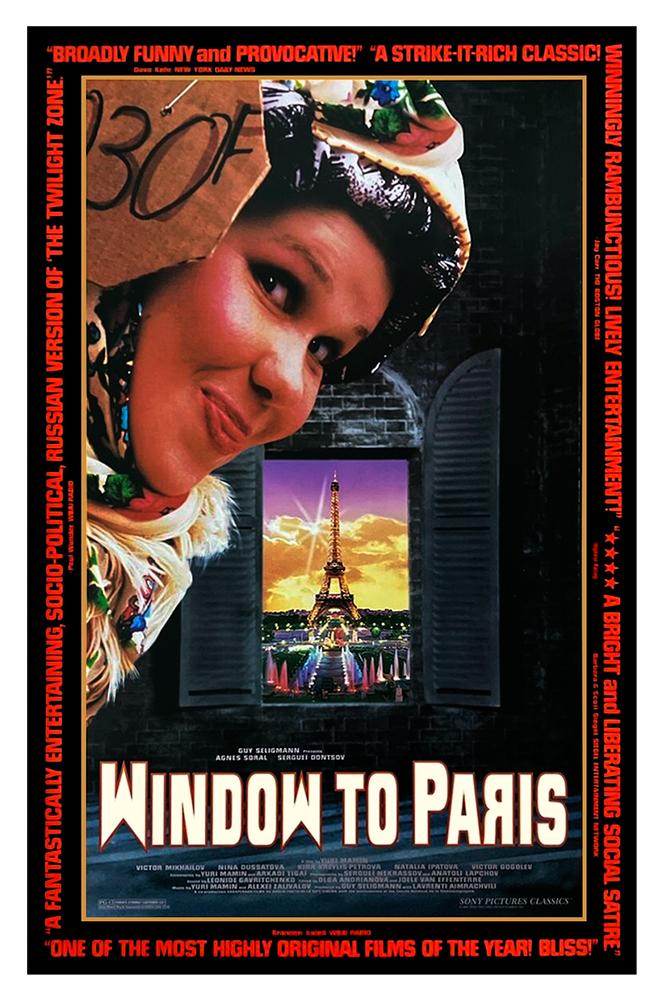 A wild, nutty and supremely engaging comedic fantasy from Russia that’s very much in the tradition of the classic IVAN VASILIEVICH CHANGES HIS PROFESSION (1973). WINDOW TO PARIS (Okno v Parizh), a French co-production, was released in 1993, not exactly a boom time for cinema or society in the former Soviet Union.
A wild, nutty and supremely engaging comedic fantasy from Russia that’s very much in the tradition of the classic IVAN VASILIEVICH CHANGES HIS PROFESSION (1973). WINDOW TO PARIS (Okno v Parizh), a French co-production, was released in 1993, not exactly a boom time for cinema or society in the former Soviet Union.
A gritty picture is painted of this “miserable bankrupt country” where the struggling musician Nikolay (Sergei Dontsov) resides in the city of St. Petersburg. After getting fired from his job as a music teacher Nikolay moves into a communal flat presided over by Gorokhov (Viktor Mikhalkov). Nikolay is taking the place of an old woman who disappeared, but while drinking with his new flat-mates he sees the old woman enter the flat through a wardrobe in search of her cat (directly tying the film in with IVAN VASILIEVICH, which also featured a feline MacGuffin). She promptly disappears back into the wardrobe, a search of which reveals a heretofore unseen window.
The window leads to Paris, which is cleaner, brighter and altogether livelier than the drab environ Nikolay and Gorokhov inhabit. It transpires, though, that the window to Paris won’t stay open forever, with a handwritten wall chart made by one of the flat’s previous tenants warning that the window is about to vanish, and will stay gone for the next twenty years. Thus Nikolay and Gorokhov make sure to have as much fun as they can in Paris by panhandling, shoplifting and blithely using the property of the Parisian woman who owns the house containing the window.
That woman, the attractive Nicole (Agnès Soral), is initially opposed to the Russian interlopers in her midst, but grows increasingly enamored with Nikolay after he frees her from jail in Russia, where she finds herself after climbing into the window. Things come to a head when Nikolay leads a group of Russian schoolchildren through the window and then loses sight of them on the streets of Paris, a particular problem since the window is about to make its scheduled disappearance.
The directors Yuri Mamin and Arkadiy Tigay exploit their slight-but-amusing premise for all it’s worth. The consistently lively narrative is quite something to behold, with complications a-plenty amid multiple characters (none of them very sympathetic), an antic atmosphere that’s impressively maintained and a potent (if heavy-handed) message about the necessity of making the best of one’s present circumstances.
Despite a surprisingly earthy tone (the antic staging of IVAN VASILYEVICH is nowhere to be found) plausibility is jettisoned, with any number of illegal acts committed by the protagonists, including assaulting a police officer and hijacking an airplane(!), that are never accounted for. Furthermore, the editing has a tendency to make huge leaps forward in time (such as cutting from the protagonist being waylaid on a street in Paris to him ensconced in his flat in Russia) that inspires confusion above all else. Co-director Yuri Mamin has likened movies to “musical works of art,” and appears to have constructed WINDOW TO PARIS according to the laws of music, with narrative continuity an afterthought.
So yes, this film has many faults. I, however, was having too much fun watching it to care.
Vital Statistics
WINDOW TO PARIS (Okno v Parizh)
Fountain Cinema/Les Film Du Bouloi/La Sept Cinema
Directors: Yuri Mamin, Arkadiy Tigay
Producers: Lavranti Aimrachvilli, Guy Séligmann
Screenplay: Vyacheslav Leykin, Yuri Mamin, Feliks Mironer
Cinematography: Anatoly Lapshov, Serguéi Nékrassov
Editing: Olga Adrianova, Joële Van Effenterre
Cast: Sergei Dontsov, Viktor Mikhalkov, Agnès Soral, Nina Oussatova, Kira Kreilis-Petrova, Natalya Ipatova, Viktor Gogolev, Tamara Timofééva, Andrey Urgant, Jean Rupert, Malka Ribowska, Bernard Cassus-Soulanis, Vladimir Kalish, Aleksey Zalivalov, Alexej Kozodajev, Yelena Drapeko
